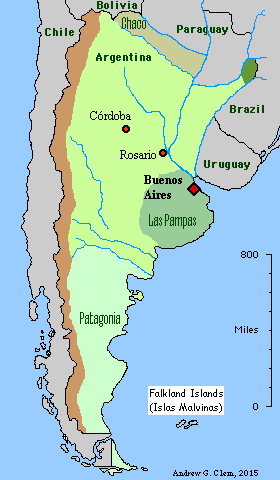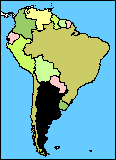
PRESIDENT: Cristina Fernandez de Kirchner (Nov. 2007-2015; reelected Oct. 2011)
POPULATION: 43.0 million
KEY EXPORTS: Grains and livestock

PRESIDENT: Cristina Fernandez de Kirchner (Nov. 2007-2015; reelected Oct. 2011)
POPULATION: 43.0 million
KEY EXPORTS: Grains and livestock

Home page >> Latin America Intro page >> Argentina ("under reconstruction")Updated:
Chronology: |
|
| 1800s (early): |
"United Provinces of Rio de la Plata" decl. indep. 1816; long civil war ensues. |
| 1800s (mid): |
Dictatorship of Gen. Juan Manuel Rosas, 1835-1852. Federal constitution, 1853. |
| 1800s (late): |
War against Pampas Indians, 1878-1883. Beef exports to Europe via refrigerated ships. |
| 1900s: | |
| 1910s: | H. Yrigoyen wins first democratic presidential election, 1916. |
| 1920s: | |
| 1930s: | Military coup in 1830, econ. & social chaos. |
| 1940s: | Gen. Juan Peron elected pres., 1946. |
| 1950s: | Military coup ousts Peron, 1955. |
| 1960s: | Military coup: 1966 |
| 1970s: | Peron returns from exile, is elected pres., 1973, dies in 1974. Military coup ousts Pres. Isabel Peron, 1976. Dirty war begins. |
| 1980s: | Defeat in Falklands/Malvinas war vs. Britain, and debt default: 1982.
R. Alfonsin is elected pres., 1983. |
| 1990s: | Pres. Saul Menem (Peronista) stabilizes the economy, is accused of corruption. |
| 2000 | |
| 2001 | Economic austerity sparks riots, Pres. de la Rua resigns in Dec. Chaos, financial panic, govt. defaults on private debts. |
| 2002 | More riots; new Pres. Duhalde calls on Latin America to resist foreign (U.S.) domination; Arg. peso falls sharply; IMF grants credit extension; Arg. defaults on debt to World Bank in Dec. |
| 2003 | Kirchner wins pres. election, purges top military officials and Supreme Court. Arg. defaults on $3 billion payment to IMF, then gets a new $21 billion debt rescheduling deal. |
| 2004 | IMF internal report blames itself for contributing to Arg. economic crisis. Homemade bombs at two banks in Buenos Aires. |
| 2005 | 175+ die in a fire at Buenos Aires night club. Economy recovers since debt burden was lifted. Kirchner's new "Peronista Victory Party" wins big in congressional elections. |
| 2006 | MERCOSUR summit in Cordoba, attended by Hugo Chavez (Venezuela joined), Fidel Castro, and six other heads of state. |
| 2007 | World Court rules in favor of Argentina in dispute with Uruguay over pulp mill. Teachers go on strike. Govt. is accused of manipulating statistics to reduce inflation rate. First Lady Cristina Fernandez de Kirchner wins pres. election. |
| 2008 | Venezuelans gave $800,000 to Cristina Fernandez de Kirchner's campaign; bribery? Farmers go on strike to protest tax hikes on agricultural exports. |
| 2009 | |
| 2010 | |
| 2011 | |
| 2012 | |
| 2013 | |
| 2014 | Debt default |
|
SOURCES: Washington Post, CNN, etc. Argentina newsBuenos Aires Herald (English) |
|


Contrary to what its name implies, there were never any major discoveries of silver in Argentina. The country is blessed, however, with abundant fertile soil and has a mild climate ideal for agriculture, especially in the region called "Las Pampas." The Andes Mountains in the west create a barrier to commerce with Chile. The north is tropical climate, ranging from the Gran Chaco desert in the northwest to the lush rain forest in the northeast, where Iguazu Falls is located. The southern region of Patagonia is a rugged and bleak wilderness. Two large rivers -- the Parana and the Uruguay -- join to form the "Rio de la Plata" (River of Silver) just upstream from the capital.
Argentina has failed to live up to its vast economic potential, and there have been many coups d'etat and uprisings throughout its history. In the years after independence, a dictator named Manuel de Rosas dominated the country. During this time, there was intense rivalry between the capital city of Buenos Aires, the only major port, and the interior provinces. Not until the civil wars finally ended at mid-century was the makeup of the country firmly established. The period 1880-1914 was the golden era of economic growth, as the advent of refrigerated cargo ships made possible exports of beef to Europe. Buenos Aires became known as the "Paris of South America." Liberal politics never really gained a firm foothold, partly because of flawed leaders. Hipolito Irigoyen (1916-1922; 1928-1930) was an enigmatic character whose Radical Civic Union (UCR) party lacked a clear policy program. After a series of military governments, General Juan Peron was elected president in 1946. His movement was tainted by the fascist influence of early World War II. He was a typical Latin American military populist leader, who had good luck (i.e., an economic boom), misleading millions into believing in his brilliance and leadership abilities. After his beloved wife Eva died of cancer in 1952, however, he was never the same, and in 1955 he was forced to resign and go into exile. Peron returned as president in 1973 but died a year later, and his second wife Isabella became president but failed to cope with mounting problems and was deposed in 1976. General Jorge Videla took power and launched the "Dirty War" against leftist dissidents, and over 10,000 "disappeared." Facing economic disaster, he resigned in 1981, and his successor sent military forces to occupy the Falklands (Malvinas) Islands, a venture that ended in total defeat at the hands of Great Britain, paving the way for a return to democracy. The government of Raul Alfonsin failed to stabilize the economy, and Argentina experienced hyperinflation. In 1989 Carlos Menem, a charismatic Peronista, was elected. After taking office he reneged on his populist campaign promises and, to the surprise of many people, launched a harsh orthodox austerity program. His government sold state assets, including many inefficient state enterprises, and linked the peso to U.S. dollar, which for a while succeeded in stabilizing the financial system. Most people grudgingly agreed that that his tight budget and privatization policies were necessary, and it seemed that Argentina was on the road to success at long last. Eventually the corrupt deals behind the privatization were exposed, however, and the Argentine treasury was in a precarious position when the Asian economic crisis spread to Latin America in 1998. Menem's dollarization of the economy turned out to be a fatal mistake, and he ended his term in disgrace as scandals mounted.
Argentina is widely known for the tango, an exotic style of music and dance based on the accordion. The country's greatest author was Domingo Sarmiento who wrote Facundo, a harsh and thinly veiled satirical lampoon of the dictator Manuel Rosas (1830-1852). Sarmiento served as president from 1868 to 1874. The growth of a livestock economy in the late 19th century created a new class of itinerant cowboys, know as gauchos. Argentine people became accustomed to eating beef, consuming 50 percent more of the red meat than the average American. The heavy immigration of Italians in the late 19th century influence on the culture, and the people still regard themselves as "more European" than any other Latin American country. This pride often goes overboard, however, to the extent that Argentines tend to regard themselves as immune from the normal laws of society.

Lake Nahuel Huapi, west of San Carlos de Bariloche; El Tigre Club; and the capitol building in Buenos Aires, where the Congress of the Argentine Republic convenes.
(Photo by Remey L. Clem)
Upcoming presidential elections: October 2015.
Argentina exemplifies the tendency in many Latin American nations to shun self-examination and blame imperialists for their own problems. The scandals and crises of 2000 through 2004 have discredited free-market policies once again, as under-educated people are falling victim to scare-mongering nationalists who regard economic liberalism as a surrender of national sovereignty. One of the more telling (and amusing) events of recent years was the fierce protest against the August 2002 visit of U.S. Treasury Secretary Paul O'Neill, who had angered Argentines by warning against lending more money to Argentina or other Latin American countries if the money was just going to end up in somebody's Swiss bank account. In fact, that is exactly what Argentine people have been denouncing their own leaders for doing! In protest marches during the first half of 2001 one would see placards that said, "Politicians are lying thieves!" But when a foreigner dares to suggest such a thing, that's considered an affront to the entire nation.
Political party labels are problematic in Argentina, which has seldom experienced stable democratic politics. The centrist or center-left Radical Civic Union (UCR) has never had a clear economic strategy. The "Justicialista" party founded by Juan Peron has long been dominant, but its populist orientation has resulted in repeated failures. President Carlos Menem (1989-1999) adopted radical free-market reforms that alienated his Peronista party's core labor constituency. As a result of the scandals of the and the subsequent financial calamity, the Peronistas have split into factions in recent years. There are also minor parties on the left, on the right, and some that have specific regional bases of support.
As the budget deficit climbed under President Fernando de la Rua (inaugurated in December 1999), the fixed exchange regime began to cause a huge balance of payments deficit. All during 2001 the economic crisis in Argentina seemed on the verge of a total meltdown, but somehow they staved off the inevitable until the end of the year. After the government literally ran out of money and checks started bouncing all over the place, popular discontent finally exploded: Hundreds of stores were looted and burned, and the proud, elegant capital of Buenos Aires started looking like Beirut. De la Rua was forced to resign in December 2001, and five people took his place in rapid succession over the next few weeks.
In 2003, another Peronista was elected as president, Nestor Kirchner, and he soon surpassed the modest expectations that most people had of him. Once seen as a front man for his predecessor Duhalde with only a weak electoral mandate, he boldly confronted the military and political forces such as the Supreme Court, sharply curtailing the influence of Menem appointees. His "take-it-or-leave-it" negotiating stance with the IMF paid off as well, as Argentina obtained necessary rollover loans that enabled the economy to keep growing in spite of the default on debt obligations in 2001 and 2002. Kirchner push for greater diplomatic-economic cooperation with Brazil, which historically was Argentina's rival, has paid off handsomely. The MERCOSUR economic alliance has become stronger as well. Kirchner's wife Cristina Fernandez easily won the elections in October 2007, but there were accusations that her campaign accepted money from Venezuela, tainting her government.
Senate: 72 seats; one-third of members elected every two years to serve six-year terms.
Chamber of Deputies: 257 seats; one-half of members elected every two years to serve four-year terms.
| UNEN Broad Front (Radical Civic Union, Socialists, etc.) |
Front for Victory * (Peronista) + allies | Federal Peronism ** | Others | Republican Proposal |
| S: 19 | S: 40 | S: 7 | S: 3 | S: 3 |
| CD: 60 | CD: 130 | CD: 37 | CD: 10 | CD: 20 |
NOTE: Width of each column shows each party's approximate strength. Colors and position (left to right) represent ideological leanings, which are often vague. Numbers show how many seats each party has in the Senate and the Chamber of Deputies; numbers in parentheses show net change after Oct. 2007 election. Minor parties are not shown.
* The party of President Cristina Fernandez de Kirchner.
** The dissident faction of the Peronista party led by ex-President Eduardo Duhalde.
SOURCE: CIA World Factbook, Wikipedia